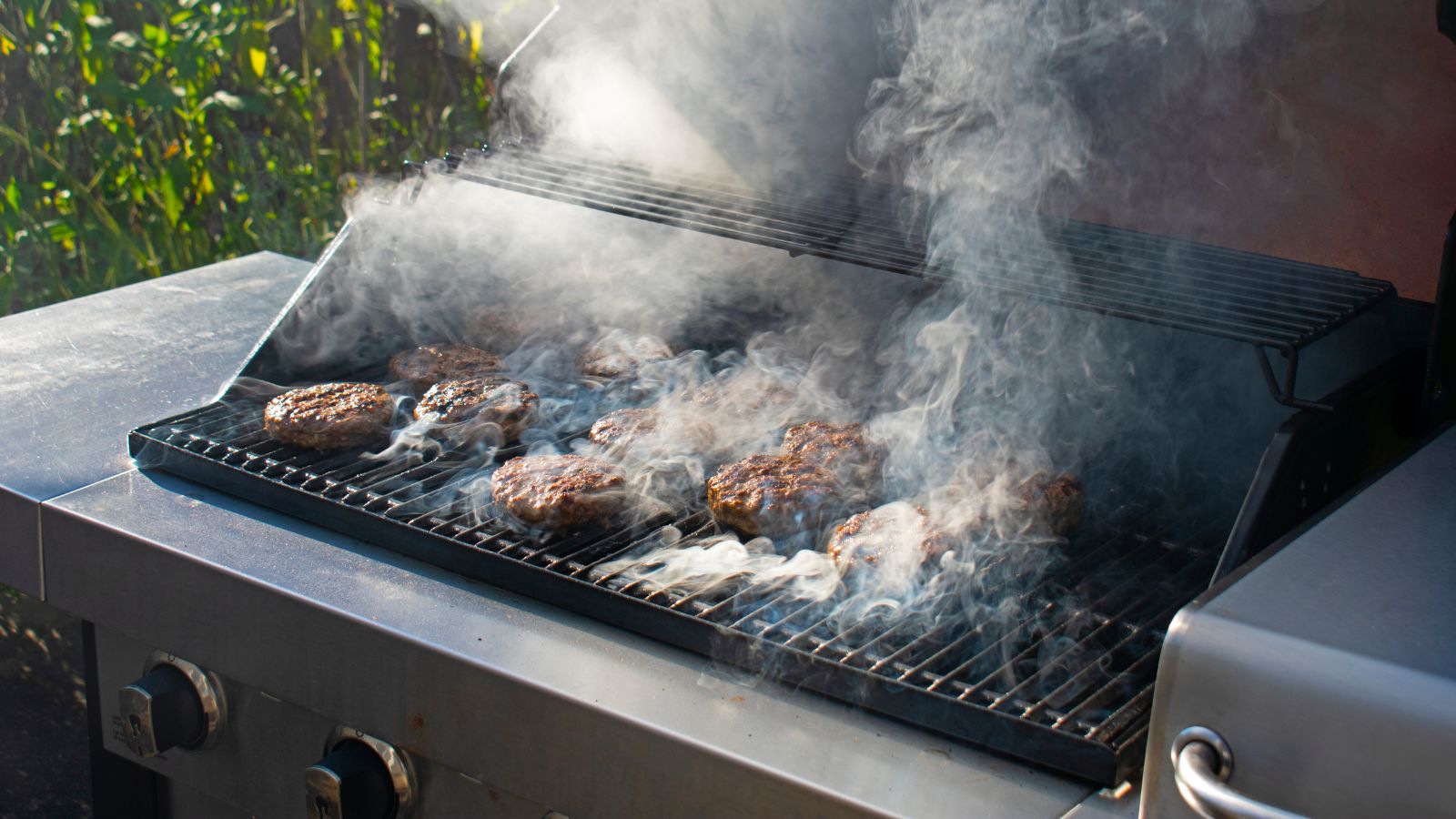Is grill smoke unhealthy? Expert medical advice
I spoke to doctors to find out if grill smoke is unhealthy and how to reduce inhalation when grilling


We've all been there: it's a beautiful day, you're grilling in the yard, then the wind changes and you accidentally inhale a lungful of smoke.
It happens to everyone once in a while, but while it's expected, it's wise to worry that there are more serious health concerns than a little spluttering.
I've tested dozens of the best grills and years of grilling have taught me that inhaling grill smoke can be pretty painful. I spoke to two doctors about the health effects of grill smoke, whether there are any long-term concerns, and how to reduce exposure to smoke when grilling.
Is grill smoke bad for you?
The short answer is that grill smoke is bad for you. Many of the same risks of cigarette smoke are also present in grill smoke, which is mostly made of carbon monoxide and carbon dioxide.
Dr Raj Dasgupta told me that 'Grill smoke can be unhealthy to inhale. It can have harmful chemicals in it, including polycyclic aromatic hydrocarbons (PAHs) and heterocyclic amines (HCAs), which are both produced when meat is cooked at high temperatures.'
Dr Sanjay Rajagopalan agrees, and told me that 'Grill smoke contains a number of chemicals that are hazardous, some of which are carcinogenic. These include various PAH compounds that are toxic, particularly at high concentrations and with protracted exposure.'
However, he notes that the toxicity depends on a few factors, 'that include both the generation of the fumes and the disposal through adequate ventilation.' In short a little smoke from grilling burgers is largely fine, but inhaling a lot of wood hickory smoke as you smoke a brisket is more dangerous.

Dr. Raj Dasgupta, Chief Medical Advisor for Fortune Recommends Health, is quadruple board certified in Internal Medicine, Pulmonary, Critical Care, and Sleep Medicine. His extensive experience as an active clinician and clinical researcher positions him at the forefront of medical advancements. With over two decades of global teaching and clinical research, Dr. Dasgupta is a respected authority in his field.

Dr. Sanjay Rajagopalan is a distinguished leader and innovator in cardiovascular medicine, with over 20 years of experience in clinical, academic, and scientific roles. He is currently the Chief of Cardiovascular Medicine, Herman Hellerstein, MD Professor of Cardiovascular Research, Chief Academic and Scientific Officer at University Hospitals (UH) Harrington Heart and Vascular Institute and Director of the Case Cardiovascular Research Institute at Case Western Reserve School of Medicine.
What short-term issues can grill smoke cause?
Inhaling too much grill smoke can cause minor symptoms of smoke inhalation. It can cause shortness of breath, a cough, a sore throat, as well as irritation to your nose and eyes.
Dr. Sanjay Rajagopalan told me that 'Short term effects associated with high exposure to short durations of grill smoke when outdoors may produce irritant effects on the upper airways and eyes, but is usually self limiting when exposure stops.'
Dr Raj Dasgupta added that 'In the short term, exposure to grill smoke can cause respiratory irritation, coughing, and shortness of breath. It can also exacerbate symptoms in people with asthma or other respiratory conditions.'

What long-term issues can grill smoke cause?

Grill smoke has also been linked to chronic health effects. Repeated and long-term exposure to grill smoke increases the risk of respiratory problems, cardiovascular disease, and cancer.
Dr Raj Dasgupta told me that 'Long-term exposure to grill smoke can increase the risk of developing respiratory conditions and cardiovascular diseases. It may also increase the likelihood of developing certain types of cancer, specifically because of the carcinogenic compounds found in the smoke.'
However, while it's highly likely that grill smoke can increase the risk of several conditions, it has never been proven. Dr Rajagopalan says that 'Although cardiovascular effects have been described with exposure to particulate air pollution, there has never been long-term follow-up studies as these are virtually impossible to conduct given the intermittency of exposure.' It's hard to directly link grill smoke to cancer, but while unproven, it is likely.
How can you reduce the harm of grill smoke?
There are a few ways to reduce the harm of grill smoke. The first is to always grill outdoors, and always grill in well-ventilated areas. Your grill shouldn't back onto walls, or have any covering about it, because this traps the grill smoke and increases the chance of inhaling it. You should also regularly clean your grill, because this stops grease and food residue from building up and cause more smoke.
Interestingly, both doctors I spoke to also recommended using leaner cuts of meat to reduce the smoke. Dr Dasgupta told me to 'use leaner cuts of meat to reduce the amount of fat that drips onto the flame,' and Dr Rajagopalan said that 'here is some evidence that fatty meats may generate the highest amount of PAH and toxicity'.
Leaner cuts of meat have less fat, which produces less smoke. Dr Dasgupta also said to 'consider marinating your meat before grilling it to reduce the formation of harmful chemicals.'
Grill smoke FAQs
Can grill smoke trigger asthma?
Grill smoke can be especially harmful to people with asthma, and can trigger your asthma.
For more information about grill smoke, take a look at our guides to the best wood for smoking and HOA grill smoke rules.
Sign up to the Homes & Gardens newsletter
Design expertise in your inbox – from inspiring decorating ideas and beautiful celebrity homes to practical gardening advice and shopping round-ups.

As a gardens and lifestyle contributor, Alex makes sure readers find the right information to help them make the best purchase. Alex got his start in reviewing at the iconic Good Housekeeping Institute, testing a wide range of household products and appliances. He then moved to BBC Gardeners’ World Magazine, assessing gardening tools, machinery, and wildlife products.
-
 Martha Stewart's quiet luxury rose garden is the most magnificent I've ever seen – it's the jewel of her Bedford farm (but she doesn't gatekeep her planting tips)
Martha Stewart's quiet luxury rose garden is the most magnificent I've ever seen – it's the jewel of her Bedford farm (but she doesn't gatekeep her planting tips)Cantitoe Corners is a rose-lover's paradise – but you don't need acres of manicured grounds to enjoy this bloom, as Martha herself shares
By Megan Slack
-
 Underrated plants – 9 unsung garden heroes we all should grow, say horticultural experts
Underrated plants – 9 unsung garden heroes we all should grow, say horticultural expertsDiscover why we should all make room for these plants in our yard
By Jill Morgan